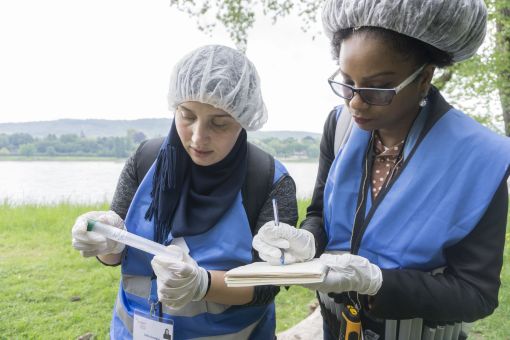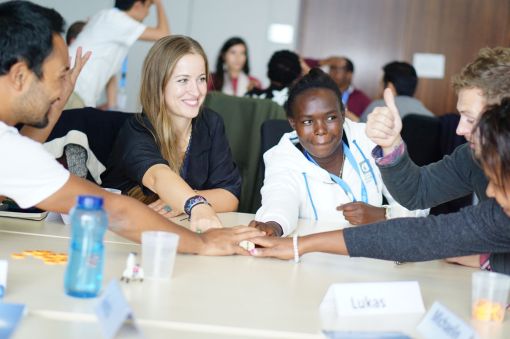Drought, storm, flooding: natural hazards and their impact on human security are the focus of the Master’s programme “Geography of Environmental Risks and Human Security”. The programme has been part of the Development-Related Postgraduate Courses since 2017. The DAAD awards up to eight full scholarships to students from developing countries each year.

In a summer school, students simulated the hazards of flooding on the bank of the Rhine in Bonn ©UNU-EHS/ Aileen Orate
The international Master’s programme is offered jointly by the Geographical Institute of the University of Bonn and the Institute for Environment and Human Security at the United Nations University (UNU-EHS). The Master’s is designed to deal with natural events that suddenly threaten the lives of people or the future of entire regions, such as the tsunami in the Indian Ocean in 2004, the earthquake in Nepal in 2015, or the hurricane that devastated Puerto Rico and the Dominican Republic in autumn 2017. The programme also examines environmental risks that develop gradually and that only attract media attention occasionally, such as droughts in many parts of Africa. All these events destroy livelihoods and force people to flee.
Ensuring people’s safety
“Just as important as physical aid is the scientific analysis of environmental risks, which – if ignored – can have devastating consequences for people, especially in the poorer regions of the world,” says Karen Hattenbach, coordinator of the study programme at the UN University. “What are the causes and how are environmental risks identified? How are the population and politics dealing with the consequences of climate change? How are humanitarian missions coordinated locally and in supraregional and international cooperation? These are the types of questions our students deal with”, explains Hattenbach. “Research involves analysing how structures should be designed so that the countries concerned can better identify and counteract environmental risks in the future. Only then will it be possible for society and the economy to develop continuously and permanently.”
Students, mainly of geography and the social sciences, have been coming to Bonn for the English-language Master’s programme since 2013. The research-oriented courses of the first three semesters are followed by a vocational internship at an international research institute – at one of the UN institutes based in Bonn, for instance, or in another internationally active organisation. Afterwards the students write their master thesis.
Interest in the course is high. “We receive about 500 applications for 24 places per year”, says Hattenbach. “16 places are awarded to international students, eight to German students.” Prerequisites for selection include more than just a very good academic record and English language skills. “We’re looking for people who are internationally oriented and who have already been active in our areas of focus if possible.”
Impact of climate change
Michaelin Sibanda from Zimbabwe, one of the first six DAAD scholarship recipients, has already worked in development cooperation. She hopes to gain further impetus from her studies in Bonn. “I’d like to learn more about food security and the impact of climate change on agriculture, for example.”
DAAD scholarship holder Reksa Abdul Fikri Angga focuses on science and has previously done research at the Indonesian Institute of Sciences (LIPI). “Compared to many other countries, Indonesia is severely endangered by natural disasters”, he stresses. “The rapidly growing population is exacerbating environmental and social problems. Cities are confronted with flooding and landslides as well as social inequality and poverty.” In the Master’s degree programme, he is therefore interested in interdisciplinary methods and approaches to finding solutions for developing sustainable cities.






